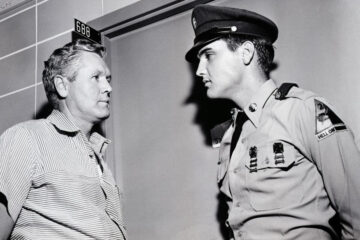For a band to succeed and have a long career, there need to be learning periods. There are no boundaries on what a band can pick up on, but for many, it pertains to how they write music, perform, and what topics they want to cover. The Rolling Stones have always been pretty apolitical, primarily to their benefit, but a definitive moment cemented that stance.
“It was a very strange time in France. But not only in France, but also in America, because of the Vietnam War and these endless disruptions,” said Jagger in regards to the track ‘Street Fighting Man’. “I wrote a lot of the melody and all the words, and Keith and I sat around and made this wonderful track, with Dave Mason playing the shelani on it live… It comes in at the end of the tune. It has a very wailing, strange sound.”
The Rolling Stones were yet to write anything political, but given there was a lot of unrest surrounding the Vietnam War, it was only natural the band gravitated toward expressing their discontent in their music. The deciding factor was during a march that Mick Jagger attended in London; it sparked something in him that made him want to express his dismay with how the war was handled.
In 1968, there were student riots in both London and Paris, where people would gather in the street and march in protest. Jagger joined a demonstration in Grosvenor Square on March 17th, where the plan was to march to the American embassy. Over 25,000 people entered, but before the crowd could get to their destination, things turned violent.
Jagger left before everything got out of hand because his celebrity was getting in the way of the actual cause. After he departed, horse-mounted police charged the crowd, so protestors responded by throwing rocks and smoke bombs at them. In the end, 200 people were taken to the hospital, and another 246 people were arrested.
Despite Jagger not seeing the violence that ensued, the event was enough for him to write his protest song. There was trepidation written into the lyrics, where Jaggers’s point was clear, but he also felt slightly powerless. He wrote, “The time is right for fighting in the street,” before saying, “But what can a poor boy do, ‘cept sing in a rock and roll band.”
The song wasn’t well received; it never received an out-and-out ban, but radio stations were advised not to play it at risk of inciting violence. “The radio stations that banned the song told me that ‘Street Fighting Man’ was subversive,” said Jagger, “’Of course it’s subversive,’ we said. It’s stupid to think you can start a revolution with a record. I wish you could!”
In the long run, the adverse reaction to the song worked in The Rolling Stones’s favour. This likely spurred the band to have a more apolitical viewpoint, where they wrote about rock and roll more than anything else, which led to them developing a wider fanbase and appeal to people of all backgrounds.




